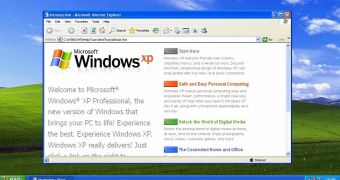Windows XP remains the second most-used operating system worldwide despite Microsoft's efforts to move people to a different platform, and this is quite a serious issue, CERT Australia warned in a new paper published recently.
CERT Australia conducted a survey to find out how many organizations are still running Windows XP, with stats showing that Microsoft's unsupported operating system continues to be the platform of choice for nearly half of the respondents.
The survey findings show that 47 percent of the organizations are still using Windows XP, while 1 percent apparently don't know if they still have computers powered by this particular operating system or not.
When asked if they know that Microsoft pulled the plug on Windows XP on April 8, 97 percent of the respondents said “yes,” which pretty much means that they're aware that their computers could become vulnerable to attacks but they don't want to do anything about it.
Out of those still running Windows XP, 79 percent said that they were indeed planning to move to a different platform.
“Of concern, 13% of the organisations using windows XP did not have plans to migrate to other software before April 2014, and 8% didn’t know if their organisation had such IT security plans in place,” CERT Australia said in the report.
“Organisations that still use windows XP after 8 April 2014 are at an increased risk of network vulnerability and compromise, as the software is no longer being supported or patched. Anecdotal reports indicate that cyber criminals have been ‘stockpiling’ new XP attacks, waiting for support to end.”
In this context, it's no surprise that cyber attacks in Australia are on the rise, but the security organization says that unsupported software is just one of the factors behind this increase.
“The main motivation for cyber-attacks is considered to be competitors seeking commercial advantage. This aligns with the cyber threat of most concern to businesses, which is theft or breach of confidential information or intellectual property,” George Brandis, Australia's Attorney General and Minister for the Arts, said.
“This of course has recently come to prominence through the US indicting Chinese officials for the theft of IP from US companies by cyber means.”
And still, there's no doubt that Microsoft and security companies across the world would need a few more years before completely getting Windows XP off the market. With 26 percent of the desktop computers worldwide still running it, it's hard to believe that so many users would jump ship overnight, especially because the migration to a different operating system also involves high costs related to hardware purchases.
Microsoft, however, warns that once an unpatched vulnerability is being found, all those running Windows XP could be hacked, no matter the third-party security software running on their computer. And this thing already happened, as a zero-day flaw in Internet Explorer 8, which also runs on Windows XP, was recently reported to Microsoft, with the software giant most likely waiting for next month's Patch Tuesday rollout to fix it.

 14 DAY TRIAL //
14 DAY TRIAL //